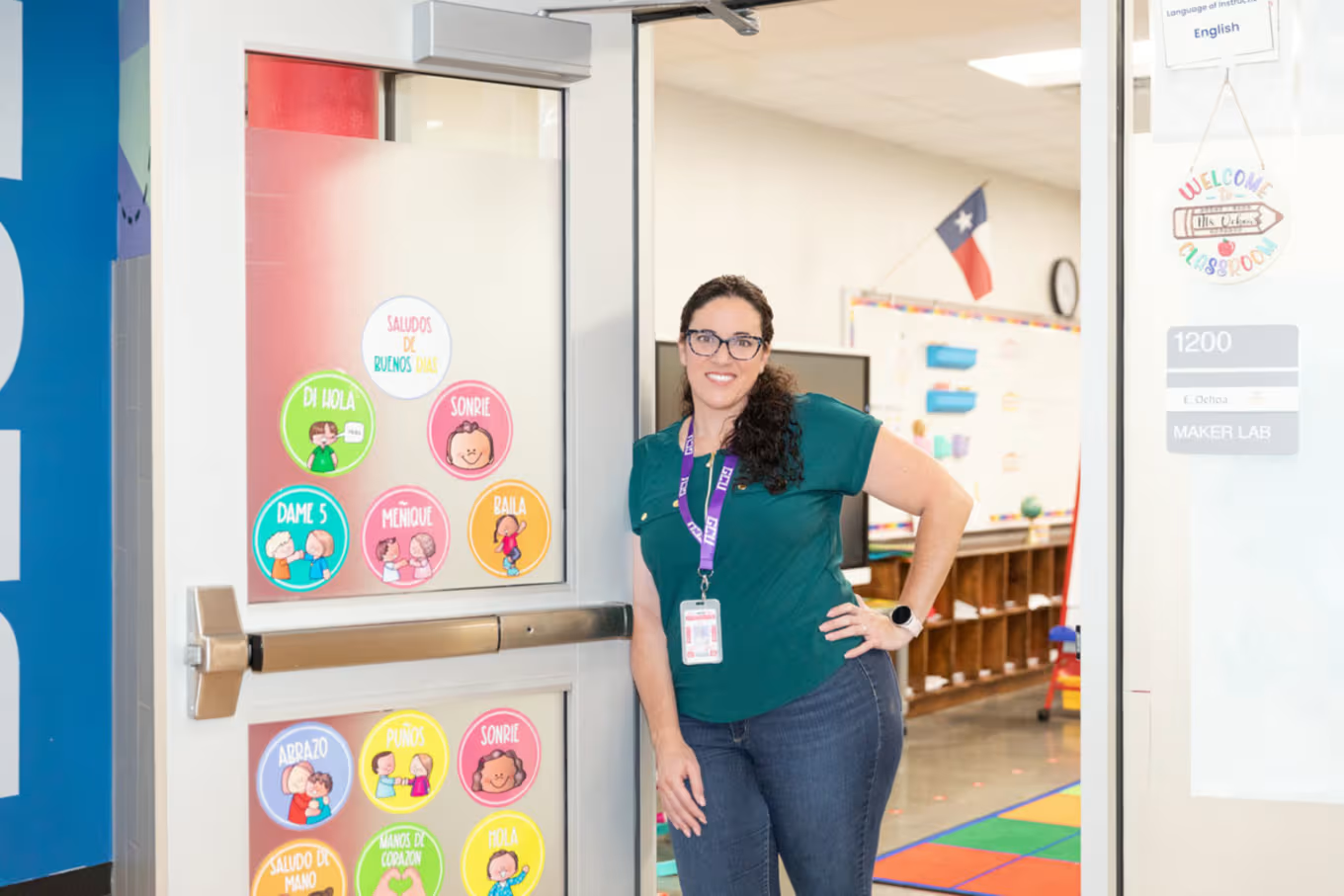Bachelor’s in Elementary Education Degree Online

Bachelor’s in Elementary Education Degree Online
journey today.
A Bachelor of Science in Elementary Education degree is an undergraduate degree program that can help prepare you for a career as a K–8 elementary teacher and to seek initial teacher licensure. This degree pathway is tailored for students aspiring to lead in the mental, emotional and social development of children, while also establishing a strong foundation in early academic fundamentals such as math and reading.
This primary education program can help prepare teachers to identify their students’ strengths and areas of opportunity. Based on those insights, teachers will tailor content, instruction and projects that aim to meet diverse student needs and interests.
Other job responsibilities may include:
In this program, you will be taught the specific knowledge and tools necessary to help you prepare to follow your passion for teaching and make a lasting impression on your students’ future.
The teacher preparation curriculum at GCU includes:
GCU offers maximum learning flexibility by offering this elementary education degree online for independent learning or on campus in a traditional classroom setting. This mode of learning helps accommodate various personal and professional commitments.
Taking classes online can offer flexibility, allowing you to learn on your own schedule.
GCU’s undergraduate teaching degree curriculum includes opportunities for relevant application of concepts, theories and research with an emphasis on elementary educational field experiences.
Teacher candidates will complete approximately 120 hours of observational and practice-based experiences in the field. In addition, candidates will complete a 15-week student teaching experience to further shape career-ready individuals to confidently enter the classroom.
Graduates who successfully complete the elementary program are eligible to apply for an elementary teaching certificate in the state of Arizona.
In this online or on-campus instructional degree program, you will explore:

Graduates with this degree may pursue careers in education as an elementary school teacher for K–8 learning environments in private or public schools. A bachelor’s in elementary education can also serve as a segue into earning a master’s degree for advanced knowledge, deepened understanding and the opportunity to position yourself for possible upward mobility.
Many of GCU’s education programs lead to an initial teacher licensure in the state of Arizona. This licensure component is completed through many hours of field work in a physical classroom setting. A degree that does not lead to licensure may still have some field experience, but may not have the lengthy time requirements needed per week that a program leading to licensure does.
Help Children Reach Their Potential
In pursuing your teacher preparation program, you can learn to help children reach their own potential while pursuing a flexible educational experience that works with your schedule.
“I’ve been able to be successful in my job and get to where I am today because of my professors and the GCU community.”
- Becca Wayne, Bachelor of Science in Elementary Education, Class of 2020
10,700
Estimated number of new jobs to open for kindergarten and elementary school teachers from 2022 to 2032.1
GCU’s program meets Arizona elementary education teaching requirements in a K-8 classroom environment. Courses and formats are approved by the Arizona State Board of Education and designed to help you strive toward earning your degree in a primary education program.
GCU’s College of Education is accredited by the Association for Advancing Quality in Educator Preparation (AAQEP), a national accrediting organization recognized by the Council for Higher Education Accreditation. Courses are also aligned to standards set by the Interstate Teacher Assessment and Support Consortium (InTASC) and the International Society for Technology in Education (ISTE).
Visit the College of Education accreditation page for information on the accreditations for GCU’s education degree programs.
Frequently Asked Questions
This section will provide you with answers to some of your most frequently asked questions, so you can make an informed decision about your academic and professional goals.
Elementary education teachers serve in K–8 settings, gaining skills to teach a broad range of content across multiple grade levels. In contrast, early childhood education focuses on teaching children from birth through third grade. While elementary education encompasses a wider span, including grades up to eight, early childhood is concentrated on the developmental needs of younger children in their early years.
The undergraduate teaching degree can be either a BA or a BS. The curriculum for a Bachelor of Arts degree is designed to be more about liberal arts and communication practices, while the Bachelor of Science at GCU may be more research-oriented.
Yes, typically, individuals who earn this teacher preparation degree are prepared to teach in elementary schools, emphasizing foundational primary skills such as literacy, numeracy, social skills and basic knowledge across subjects like language arts, mathematics, science and social studies.
This degree can help equip you with the necessary skills in curriculum development, classroom management and pedagogy to effectively teach students in elementary school through eighth grade. Additionally, obtaining state certification or licensure after earning your BS in Elementary Education degree may be required depending on the jurisdiction in which one intends to teach.
The teaching profession in elementary classrooms may be challenging; however, you may find the rewards in seeing children understand something or make a discovery on their own, which can make the hard work worth it. An education degree can help you position yourself as a more attractive candidate for a variety of career options. According to the U.S. Bureau of Labor Statistics, kindergarten and elementary school teachers have a median annual wage of $63,670 as of May 2023.2 This salary is based on a 10-month school year (two months off for summer break), which is the average length of a teacher’s contract.3
Earning a degree takes time and commitment — a reality that can be challenging if you work full time or have family responsibilities. With the online and on-campus modalities being offered at GCU, earning a degree is more possible than ever for busy adults.
Many school districts offer teachers the option of spreading out their salary over 12 months instead of just the months they're in school, which means they would get paid during the summer. The annual teacher salary will not change, rather the amount in each paycheck changes and can vary based on their assigned school district.
Explore Emphasis Options
Discover additional emphasis options that can help you find the right path for your academic and career aspirations.

Prepare To Shape Young Minds
Transform your passion for teaching into a profession. Pursue a bachelor’s in elementary education degree online or in person.
If you are seeking licensure/certification, please refer to the Accreditation and Compliance/State disclosures link for the specific program of interest’s website for your location and/or employment state licensure requirements, per 34 CFR 668.14(b)32 and 668.43(c).
1 COVID-19 has adversely affected the global economy and data from 2020 to 2022 may be atypical compared to prior years. Accordingly, data shown is effective September 2022, which can be found here: U.S. Bureau of Labor Statistics, Occupational Outlook Handbook, Kindergarten and Elementary School Teachers, retrieved on Nov. 13, 2023.
2 The earnings referenced were reported by the U.S. Bureau of Labor Statistics (BLS), Kindergarten and Elementary School Teachers as of May 2023, retrieved on July 26, 2024. Due to COVID-19, data from 2020 to 2023 may be atypical compared to prior years. BLS calculates the median using salaries of workers nationwide with varying levels of education and experience. It does not reflect the earnings of GCU graduates as kindergarten and elementary school teachers, nor does it reflect the earnings of workers in one city or region of the country or a typical entry-level salary. Median income is the statistical midpoint for the range of salaries in a specific occupation. It represents what you would earn if you were paid more money than half the workers in an occupation, and less than half the workers in an occupation. It may give you a basis to estimate what you might earn at some point if you enter this career. Grand Canyon University can make no guarantees on individual graduates’ salaries. Your employability will be determined by numerous factors over which GCU has no control, such as the employer the graduate chooses to apply to, the graduate’s experience level, individual characteristics, skills, etc. against a pool of candidates.
3 U.S. Bureau of Labor Statistics (2022, Oct. 4), Kindergarten and Elementary School Teachers – Pay. Retrieved on May 16, 2023.
